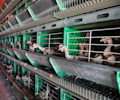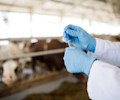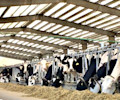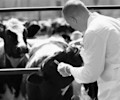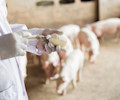Despite increasing regulation and consumer pressure, none of the ten largest publicly listed animal health companies, including Elanco, Phibro and Zoetis, has a comprehensive policy for tackling antimicrobial resistance.
Some animal health companies (such as Zydus Cadila [India] and Jinhe Biotechnology [China]) continue to sell shared class antibiotics (that may be used in humans as well as animals) for non-therapeutic purposes like growth promotion in animal agriculture, despite the threat of AMR.
Between 2015 and 2019, the disclosed lobbying expenditure of leading animal health organisations rose by 86%i in the EU and US. FAIRR finds that some companies may be lobbying against strengthened regulation in emerging markets.
London, 21 July — A study of the ten largest animal health companies by the $40 trillion-backed FAIRR Initiative finds that none of ten leading animal health companies, including Elanco, Phibro and Zoetis, has adopted a comprehensive policy for tackling antimicrobial resistance (AMR) that is consistent across markets and supports improved supply chain transparency, manufacturing standards, responsible marketing and use of antimicrobials in animal agriculture.
FAIRR’s research examines the $47-billion animal health industry, which manufactures and sells antimicrobial treatments to the animal agriculture sector, which supplies supermarkets and restaurants with meat products. It criticises the sector for a lack of transparency, from factories to sales to farm-use, and finds that current sales and marketing practices are fuelling irresponsible antimicrobial use in animal protein supply chains.
AMR is the emergence of superbugs (bacteria, viruses, fungi and parasites) that are resistant to antibiotics. An AMR crisis threatens to make even routine operations, such as hip replacements or caesarian sections, life-threatening because we may no longer have effective antibiotics available. In 2018, an estimated half a million people worldwide fell ill with a form of tuberculosis that became resistant to one of its most effective drug treatments, Rifampiciniv.
The growing threat of AMR is largely due to the inappropriate overuse of antimicrobials, the majority of which are currently used in livestock farming to compensate for poor living conditions where disease outbreaks are difficult to control. Currently, an estimated 70% of global antimicrobial use occurs in animal agriculture.
Antimicrobial-resistant bacteria originating in animals can be transmitted to humans through the environment, food products or direct contact — making antibiotics stewardship in food supply chains an absolute necessity and an urgent human health issue.
Shared-class antibiotics
Animal health companies continue to sell shared-class antibiotics for use in livestock. In the US, 65% of antibiotics considered important to human health, such as penicillin and tetracycline, are sold for use in livestock.
The biggest concern is that these shared-class antibiotics are being used routinely for non-therapeutic purposes, such as growth promotion and prophylaxis, and the long duration and lower dosages of use increase the chance of resistant bacteria developing. In the US, Switzerland and the EU, the use of shared-class antibiotics for these purposes is restricted. In emerging markets, however, non-therapeutic usage of shared-class antibiotics is more common as there is less regulation, and the enforcement of regulation, where it exists, is weaker. For instance, FAIRR finds evidence that two animal health firms, Jinhe Technology (China) and Zydus Cadila (India), sell a number of shared-class antibiotics, including Tylosin, Amoxicillin and Levofloxacin, often in large quantities, which promotes unnecessary and excessive use of vitally important human treatments.
Marketing matters
Of the ten companies analysed by the FAIRR Initiative, none has a policy on responsibly marketing antimicrobials for use in animal agriculture.
Product labelling has a significant influence on how farmers administer antibiotics to their animals. In particular, by labelling products for ‘growth promotion’ and ‘routine prophylaxis’ animal health companies are propagating the misuse of these critical drugs.
In emerging markets, moreover, product labels can be farmers’ only guide to correct usage, dosage, method of application, and expiry date as they often lack access to veterinarians. Use for prophylaxis can account for as much as 84% of total antibiotic use in animal agriculture in areas such as the Mekong Delta region of Vietnam, while in China, growth promotion accounted for an estimated 53% of the total usage of antibiotics in food-producing animals in 2018.
For example:
2019, US animal health firm, Zoetis, announced that it would remove growth promotion messaging from products containing medically important antibiotics. However, the report cites evidence that the company does still label some products for growth promotion in at least one country in Latin America.
Zydus Cadila, an animal health firm based in India, sells a product called Winmyco, which contains a high-priority critically important antibiotic for human health, Tylosin. The product is being promoted for growth purposes in India, despite a severe threat of AMR in humans as a result of its overuse.
Without a consistent global approach to labelling, marketing and product sizing, animal health companies’ practices are driving widespread use of antimicrobials in meat supply chains, which comes at a potentially deadly cost to human health.
Environmental risks
The study also highlights that waste from the manufacture of antimicrobials is polluting environments and increasing the risk of antibiotic-resistant genes spreading to humans through waterways and soils. A recent study found that at least two-thirds of the world’s waterways contain unsafe levels of antibiotics. For example, the Danube in Austria has been found to have four times the safe levels of antibiotics, while in Bangladesh concentration levels have been found at 300 times that of safe levels.
Current animal health manufacturing practices set few or no restrictions on concentrations of antimicrobials discharged in waste streams. At the recent G7 meeting on AMR, global health ministers specifically called on the urgent need to address the manufacturing industry’s waste management practices and their potential contribution to the proliferation of AMR.
Lobbying on the rise
Multi-lateral commitments, national regulations and detailed labelling on antibiotics have made some progress, but these measures have been matched by a notable increase in lobbying expenditure. In the EU and the US alone, spending has nearly doubled from 2015 to 2019. FAIRR was unable to track lobbying spend in emerging markets but found evidence that some companies may be lobbying against strengthened regulation and putting lives at risk.
Risky business: ionophores
The study finds that a lack of regulation is leading to the wide use of ‘ionophores’ which can contribute to AMR. Ionophores are antimicrobials that are classed as antibiotics by the US FDA but not by the EU. This means that some meat classed as ‘raised without antibiotics’ (RWA) can include ionophores, potentially undermining global attempts to tackle AMR.
The use of medically important antibiotics in UK poultry farming dropped by 80% from 2012 to 2017, but the use of ionophores grew by 30%. In fact, in 2020, animal health giant, Elanco, reported that 85% of its revenue from animal-only antimicrobials came from ionophore sales.
There is evidence that ionophores could be important in human medicine against widely resistant bacteria; hence, they must be administered responsibly to reduce the risk of AMR. Additionally, their environmental toxicity raises concerns about residues in food and the environment — impacting humans, wildlife, soil and aquatic organisms.
“The silent pandemic” of AMR
This year, the G7 committed to working together to “curb the silent pandemic of antimicrobial resistance” and is exploring market incentives to bring new antimicrobials to market and improve antimicrobial stewardship. For animal health companies with exposure to antimicrobials, this commitment will likely accelerate existing regulatory pressures and scrutiny from investors and consumers alike.
FAIRR’s research offers a roadmap for animal health companies and their investors to reduce AMR risk. The study finds that five of the ten companies assessed already have a ‘high exposure’ to alternative treatment options and many forward-thinking animal health companies are already reducing their exposure to antibiotics by diversifying into alternatives such as diagnostic tools, vaccines, and novel treatments. Investors are invited to participate in FAIRR’s upcoming formal engagement with the sector to ask for robust action on AMR.
Jeremy Coller, Chair of FAIRR and CIO of Coller Capital said:
“Antibiotic overuse is a pandemic accelerator hidden in plain sight.
“An estimated 70% of antibiotics are used in farmed animals, so both Pharma and farmer have a responsibility to reduce antibiotics in meat supply chains. But the animal health sector is failing to live up to its responsibilities to manage the risks we all face from antibiotic resistance. We have to ask ourselves: can the antibiotic crisis be solved without the cooperation of the $47 billion animal health sector?
“Since 2016, over 70 investors worth $5.5 trillion have successfully engaged with global restaurant chains to limit the use of antibiotics in their global supply chains. Now FAIRR is looking beyond restaurants to look directly at the animal pharma sector and its role in AMR. It’s absolutely necessary for animal pharma to improve its antibiotics stewardship. FAIRR has invited investors to participate in its upcoming formal engagement with these companies to ask for robust action on antibiotic investment risk.”
Prof. Dr. Thomas Van Boeckel, ETH Zürich said:
“The expanding use of antimicrobials in livestock, a consequence of growing global demand for animal protein, is of serious concern in light of the threat of antimicrobial resistance. An effective policy response including restrictive regulations on antimicrobial use and user fees could reduce the use of antimicrobials in food animals by up to 60% by 2030 compared with a business-as-usual target (BAU) of the continued growth of the livestock sector.
“But currently, a lack of transparency or consistent global regulation is standing in the way of improved antibiotic stewardship in our food system. Any effort to safeguard against AMR will require the cooperation of policymakers, investors, farmers and animal health firms around the globe, as well as profound changes in hygiene standards and medication for intensively farmed animals.”
Professor Dame Sally Davies, UK Special Envoy on AMR, said:
“Effective antibiotics are critical infrastructure for health systems and food systems – and both are connected. Yet the system for marketing antibiotics is broken, risking the irreversible rise of the AMR pandemic, with knock-on effects for poverty, hunger and global security.
“To build forward from COVID-19 – to sustainable, effective and accessible treatments, we need innovation right across the value and supply chain. We also must address the risks posed by treating animals with antibiotics that are medically important to humans. FAIRR’s report demonstrates the opportunities for companies and consumers of ensuring that prudent antimicrobial use becomes the social and economic norm.”
Emma Berntman, Engager for EOS at Federated Hermes, said:
“Our global medicine cabinet is running low. A pandemic, a lack of investment into new antibiotics and growing resistance mean we’re running out of options for treating the infections of the future. This has wide-ranging implications for sectors from farming to pharmaceuticals to food.
“Now is the time for leadership from investors in the fight to prevent the spread of superbugs and safeguard against a public health crisis that could cost the global economy more than a trillion dollars by 2050. We need robust investor engagement with the animal health sector on its exposure to AMR risks, policies to reduce prophylactic sales given incoming regulation and forward-looking research into alternative solutions such as vaccines and diagnostic technology. This isn’t tomorrow’s problem, it’s an urgent challenge for the financial community of today.”
Notes to editor
For more information, including interviews and comments, please contact:
Sophie Grant, ESG Communications (London)
T: +44 (0) 7817 371 323 | E: sophie@esgcomms.com
About FAIRR
The FAIRR Initiative is a collaborative investor network, founded by Jeremy Coller, with a membership of $40 trillion assets under management. FAIRR works with institutional investors to define the material ESG issues linked to intensive livestock and fish farming systems and provide them with the tools necessary to integrate this information into their asset stewardship and investment decisions. This includes the Coller FAIRR Protein Producer Index, the world’s first comprehensive assessment of the largest global animal protein companies on environmental, social and governance issues.
Visit www.FAIRR.org and follow @FAIRRInitiative
